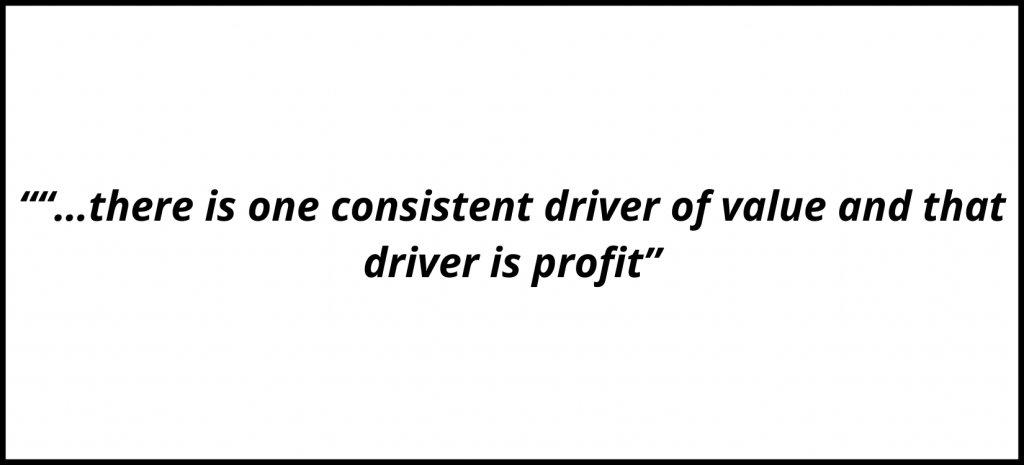What’s my brokerage worth?
“Gambling is not about how well you play the games; it’s really about how well you handle your money,” says the old gamer’s axiom. Real estate brokers have enjoyed a good run for several years and in the changing climate, many are looking to take some chips off the table and reduce their personal risk. They typically start with wanting to know the value of their brokerage.
It’s not like valuing a home, where you can run market comps. Even within the same market, comparable  brokerages will often vary greatly in value. In most industries, there are tangible assets that make up a sizable portion of company value, however, in a real estate brokerage, the most important asset isn’t even the broker’s. That asset has legs belonging to independent contractors who are free to walk away: The value of the firm is impacted by the productivity of the agents.
brokerages will often vary greatly in value. In most industries, there are tangible assets that make up a sizable portion of company value, however, in a real estate brokerage, the most important asset isn’t even the broker’s. That asset has legs belonging to independent contractors who are free to walk away: The value of the firm is impacted by the productivity of the agents.
Every week I hear the question, “what is the multiple today for valuing a brokerage?” The answer is one that brokers don’t like to hear: There is no simple magical formula for determining value because a lot of factors come into play.
Brokers understand the concept that a firm’s value is based on some multiple of profits. Where there is often a disconnect is understanding what is actually considered true profit.
It starts with the firm’s financials. One of the most important considerations is who is generating the revenue and profits within the brokerage. In smaller firms, the ownership is actively involved in listing and selling so determining how much of the revenue is generated personally by the ownership is an important question.
Even more importantly, how does the owner’s production impact the bottom line on their profit and loss statements? In many firms, a sizable percentage of profit comes from the owner’s contribution as an agent and that can have a tremendous impact on both true profitability and ultimately the value of the brokerage.
In determining value, Adjusted EBITDA (earnings before interest, tax, depreciation, and amortization) is typically used. It starts with the net profit and is based on a number of factors, the net profit number will be adjusted upward or downward. One of the biggest factors affecting the adjusted net is the officer’s earnings and how it is documented. The earnings can have a significant impact on the profit picture.
Case in point
Brokers don’t always pay themselves the same way they would pay an agent. It’s certainly their prerogative as an owner, however how brokers pay themselves can have a significant impact on the stated profits and company value.
For example, assume a broker generated $600,000 in commissions and as an agent they would have received 85% commissions. In this example, the brokerage would have paid out $510,000 leaving $90,000 in company dollar. But if that broker does not take those commissions, the net profit (and company dollar) would be overstated by $510,000 and the true profitability would be significantly overstated as well.
I find brokers often confuse their personal production with company profits. The result is the company can be worth much less than what they were expecting. The P&L’s must be adjusted to determine the true profitability and value of the brokerage.
Other factors to consider
There are other factors to weigh and adjust in examining owners’ compensation such as management salaries, personal fringe benefits, non-recuring expenses (boats, vacation homes, insurance, funded retirement accounts, family members on payroll, etc.) and non-business expenses both paid and unpaid. I have seen many instances where the broker pays themselves out of other entities such as property management or ancillary companies.
A non-financial question that has serious implications on a firm’s value is the impact of the owner’s personal involvement. If much of the continuing success of the enterprise is tied to the ongoing involvement of the owner there is greater risk which has a negative impact on value.
In planning to take chips off the table, brokers must take a serious look at their firms through the eyes of an outsider. Often, it’s hard to do so without getting emotions involved.
Casinos make their money on gamblers making emotional decisions. It is said that gamblers tend to forget their bankroll and make their decisions based on emotion. For the broker wanting to reduce risk by setting aside well-earned chips, true evaluations are based on actual adjusted financials that don’t take emotion into account.
This article was written by Rick Ellis, MBA and published in Realty Biz News
Corcoran enters Nashville
Corcoran Reverie is officially in Nashville! The rapidly growing firm with Florida offices in Santa Rosa Beach, Destin, and Panama City Beach and others, is thrilled to welcome the more than fifty agents of the highly-respected luxury firm, Worth Properties into the Corcoran Reverie family.
Worth Properties was founded 16-years ago by Janet Jones who has a long history serving the luxury market in the highly competitive Nashville market.
Nashville and the Emerald Coast of the Florida Panhandle share a direct connection with luxury buyers and the pairing of Worth Properties with the unique positioning of Corcoran Reverie has set the stage for future success in the area.
This is the 3rd merger for Corcoran Reverie in the past two years. The firm is led by Hilary Farnum-Fasth and Jacob Watkins.

Corcoran now has more than 150 offices in 40 markets across the United States. Corcoran is growing and we’re looking for a few good firms to grow with. Click here to learn about the Corcoran Network.
Realogy rebrand: buy or sell your home Anywhere

Realogy is rebranding to Anywhere Real Estate. Realogy expects to implement the rebrand by the end of the second quarter of 2022. The company stated that the rebrand signals “a deep commitment to reimagine the consumer experience at any point in the real estate transaction journey.” Read more.
Compass is burning more cash and operates more unprofitably than any of its publicly-listed peers. It is not in immediate peril, but it is approaching a critical juncture where it will either need to raise more money or reduce expenses. After years of big spending, access to seemingly unlimited amounts of capital, and sustained unprofitability, the time has come for Compass to demonstrate a durable, self-sustaining business model. Learn more.
Housing bubble 2.0? Regional housing markets are beginning to look like they did in 2007
Mark Zandi, chief economist at Moody’s Analytics, doesn’t foresee a housing bust over the coming year. However, he says “overvalued” housing markets could see home prices fall 5% to 10% over the next 12 months while national home price growth flatlines to zero. Why? Read full article.
NAR Chief Economist predicts uncertainty for the housing market
National Association of REALTORS® Chief Economist Lawrence Yun explained recently, there are significant questions regarding the sector’s direction over the coming months. While housing supply appears to be on the upswing as builders increasingly construct new homes, Yun says inflation will persist and in turn cause strain for would-be buyers. Additionally, other external economic factors will negatively impact the market, both indirectly and directly, he said. Link to article.


